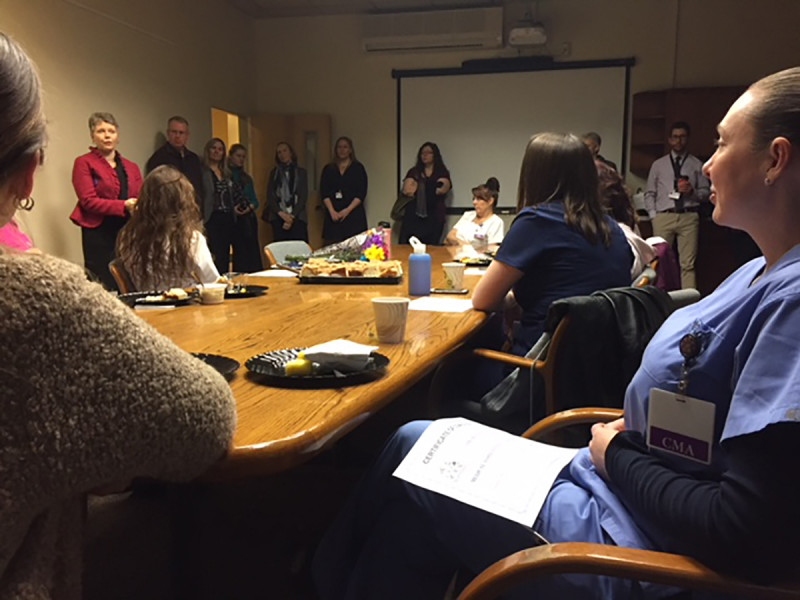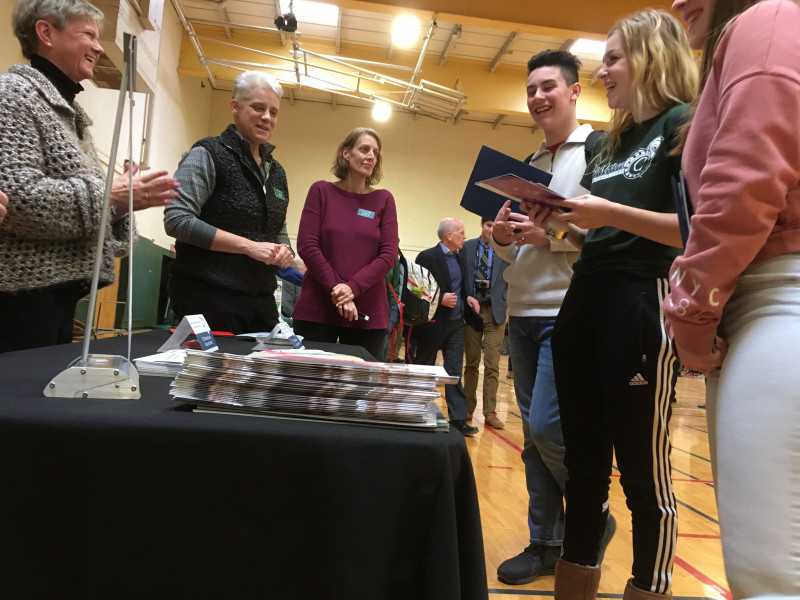
“During incarceration, I became more free than I had ever been in my entire life, and a great deal of that was education. The classrooms. The idea that there was some availability to become more than what I had entered the system as.”
Scott Barber was incarcerated at Newport’s Northern State Correctional Facility when he took CCV classes through the College’s ReSET VT program. He was joined by two fellow students, both of whom have also recently transitioned to the free world, at a roundtable on Friday with Congressman Peter Welch.
CCV launched ReSET VT in 2017 with generous support from the J. Warren and Lois McClure Foundation. The program serves as a prison-to-career pathway for inmates at Northern State, providing college courses and career preparation with the goal of reducing Vermont’s recidivism rate by helping students build credit toward a postsecondary credential, cultivate career skills, and prepare for employment upon release from prison.
“It’s easy to choose to be criminalized versus humanized,” Barber shared. “When somebody said there were college courses in jail, I didn’t believe it. I couldn’t imagine that there would be a verifiable education on a college level while I was incarcerated. The fact that meeting with [CCV advisor] Billi [Dunham] made it real that there was an opportunity, that it was almost endless in what was available, was thrilling…what happened for me, stepping into a classroom, is that I was welcomed. I was no longer an inmate. I was a human being looking for an education.”
Last spring, CCV called on its success with ReSET to apply for the U.S. Department of Education’s Second Chance Pell program, which Representative Welch helped to create, and which provides Federal Pell Grants to students who are incarcerated in federal and state prisons. CCV was chosen as one of just three schools in New England to be part of the latest expansion of the program.
Like Barber, Walter Clark also spoke to the sense of freedom he experienced while taking CCV classes. “Going in and being incarcerated, the label, it really makes you switch your personality, and who you used to be. Being able to go to CCV made me be able to go back to the functioning person in society that I was…that label gave me some self-pride back, gave me a piece of who I was back. And so it made me be able to succeed in order to want to continue and get out and go back to being able to have that freedom to choose, and go places, and be me.” Clark is currently taking 3 classes at CCV, all online, and pursuing an electrical apprenticeship through the Department of Labor’s Workforce Innovation Opportunity Act.
The Vermont Department of Corrections has been a key ReSET partner. “It had always been our passion and desire to offer post-secondary,” said Dana Lesperance, head of school for the DOC’s Community High School of Vermont. He said CCV’s approach to the program has been instrumental to its success. “So many people come into correctional facilities because they want to do good work, and they always have that at the forefront. What a lot of people don’t do is take time to understand the setting and the folks you’re working with. And that’s what CCV did. And that’s what made the difference.”
For Sean Bailey, ReSET classes have instilled a desire to keep going with his education. “I did a lot of high school while I was incarcerated, and learning just makes you feel like you’re not in jail. And the way the CCV staff treats you…they actually treat you like you’re a person, like you’re a student. And so that’s really appreciated. That’s what is making me pursue college, is my experience. I have been out for about four months now. I’m working full-time. And I’m ready to pursue an education.”
CCV President Joyce Judy spoke about the College’s long-standing partnership with the McClure Foundation. “It always is about access. How do we continue to help all Vermonters, no matter where they are or what they’re doing, how do we help them make sure that they have the skills”—borrowing a phrase from McClure Foundation president Barbara Benedict, who was also present—“so that no good job in Vermont goes unfilled because people don’t have the skills?”
CCV will build on the success of ReSET to continue offering classes in correctional facilities—and the financial assistance to help students take advantage of them—through Second Chance Pell, with the hope of eventually expanding ReSET throughout Vermont.
“Now we have a funding source to be able to support this program,” said Judy. “But we would have never been able to apply, or never received that distinction, if the McClure Foundation hadn’t worked with us to be able to prove the concept. It’s all of us working together that has made this a huge success.”
Toward the end of the roundtable, Scott Barber summarized his thoughts. “I just want to use the word gratitude. I can’t be grateful enough for the experience that I had, that shined a very bright light in a very dark place.”



